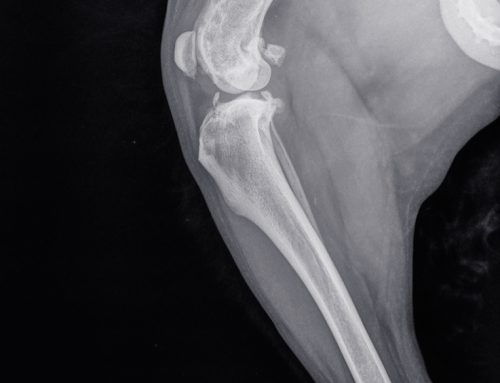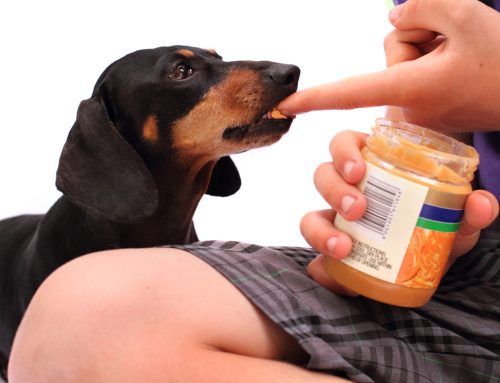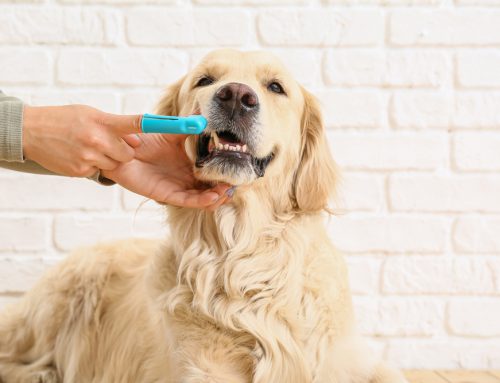You likely have a lot on your mind this holiday season. However, remember to consider the hazards your pet may face once the festivities are in full swing. While you are baking cookies, attending parties, and finding the best gifting deals, your pet could get in trouble. Yes, the holidays can be hectic, but you can plan ahead to help ensure your pet avoids an emergency. Learn about the top seven holiday pet dangers, and follow our Scripps Ranch Veterinary Hospital team’s simple steps to help your four-legged friend avoid them.
#1: Baked goods may include pet-toxic ingredients
Baked goods may contain toxic food ingredients that can sicken your pet. Avoid sharing foods with your pet that contain the following:
- Chocolate — Chocolate contains stimulant compounds that cause stomach upset and mild to severe nervous system overstimulation, including tremors, seizures, or death.
- Xylitol — This artificial sweetener tricks your pet’s body into producing too much insulin, which results in a dangerous blood-sugar crash. High doses can also cause liver failure.
- Raisins and grapes — These ingredients and common snack foods can cause dogs to experience kidney failure.
- Macadamia nuts — These especially high-fat nuts may cause your pet to experience weakness, overheating, vomiting, and diarrhea.
#2: Garlic and onions can give your pet more than bad breath
These popular recipe ingredients are members of the Allium family, which make food taste great, but cause pets problems. Garlic, onions, and related plants can damage your pet’s red blood cells and cause anemia, resulting in impaired oxygen delivery. Because many foods contain these items, avoid sharing the holiday meal with your pet and—if you cannot trust your four-legged friend—keep them away from the kitchen and dining areas.
#2: Meat scraps and gravy are too fatty for your pet
Meat trimmings, scraps, and gravy containing excessive fat can upset your pets stomach, and potentially lead to serious pancreatitis. The pancreas is important to digestion, and a sudden fat influx can stimulate digestive enzyme overproduction, damaging this organ, and causing your pet to experience abdominal pain, vomiting, lethargy, and diarrhea. Pancreatitis recovery often requires hospitalization—with fluid and medication administration—until your pet feels better.
#3: Meat bones can injure your pet’s digestive tract
Turkey or ham bones may seem like an excellent reward for a pet who waited patiently to receive their share of the holiday meal, but cooked bones can splinter and lodge in your pet’s digestive tract. If bone shards tear the intestinal wall, bacteria can leak into the abdomen and put your pet’s life in serious danger. To satisfy your pet’s chewing needs, offer them pet-safe rawhide alternatives, split antlers, dental chews, and nylon or rubber toys.
#4: Decorative holiday plants can poison your pet
Ingested holly, mistletoe, and poinsettia irritate your pet’s mouth, throat, and stomach, causing drooling, vomiting, or diarrhea. Keep these plants out of your pet’s reach, or choose a pet-safe silk version. Lilies are highly toxic to cats, and we recommend keeping them out of your home entirely. Check out this list to determine which flowers and plants will not harm your pet.
#5: Christmas trees and trimmings pose many dangers to your pet
The holiday decorating tradition poses many dangers to your pet. Be mindful about your tree and decoration placement to minimize these hazards’ risks:
- Tipping — Your Christmas tree may crash to the floor if your cat climbs up or your boisterous dog’s swishing tail becomes entangled among the branches and electrical cords. To prevent damage to treasured Christmas tree ornaments and your home, and to avoid your pet’s or a person’s injury, use fishing line or commercial products intended for this use to secure the tree to furniture or a wall.
- Electrical cords — Pets who chew plugged-in electrical cords, such as string light cords, can be shocked or burned, and potentially start a house fire. Supervise pets while decorative lights are shining, and unplug them when you are away from home.
- Tinsel — Cats find tinsel irresistibly shiny and fun. However, if your cat swallows a strand or two, these decorative fibers can cause intestinal bunching and obstruction. Forgo the tinsel if you have a curious, playful cat.
- Ornaments — Low-hanging glass ornaments can shatter if your pet bumps them, and homemade salt dough ornaments can be poisonous if ingested. Use nonbreakable ornaments, and keep them out of your pet’s reach—on the tree’s top section.
- Tree water — The water basin that provides nutrients to live trees contains chemicals, and the stagnant water can grow harmful bacteria or fungi. Prevent your pet from drinking water in the Christmas tree’s base by covering the receptacle, or use gates to block your pet’s tree access, which can also prevent your four-legged friend from tearing open the gifts before Christmas day.
#6: Candles are not pet-friendly
Your curious cat is likely to investigate a burning candle, and could inadvertently knock over this fire hazard. Supervise your pet when you are burning candles, and always extinguish the flames when you leave the room.
#7: Guests and pets

All but the most outgoing pets feel anxious around unfamiliar people and noise. Confine your pet—or give them the option to retreat—to a quiet area of your home. Provide your pet with comfy bedding, familiar toys, and long-lasting treats or chews to keep them occupied. Before you allow your pet to interact with guests, ensure your visitors are comfortable around animals. In addition, to prevent guests from feeding your pet table scraps, provide your visitors with treats to share with your four-legged friend. You may also consider asking your veterinarian to recommend anxiety-relieving supplements, medications, or other products that can help your nervous pet relax.
Follow these tips to help your pet avoid unforeseen holiday hazards. Although an accident may still happen, being prepared can help you stay cool and collected if trouble arises. Keep our Scripps Ranch Veterinary Hospital team’s phone number handy, and call us if your pet has a holiday mishap. If you have an after-hours emergency, reach out to your local veterinary emergency hospital, the ASPCA Animal Poison Control Center, or the Pet Poison Helpline for guidance.





Leave A Comment